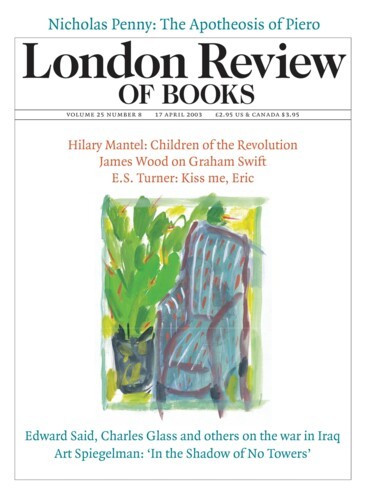For it is said, they went to school at Gabii, and were well instructed in letters, and other accomplishments befitting their birth. And they were called Romulus and Remus (from ‘ruma’, the dug), as we had before, because they were found sucking the wolf.
Plutarch, Parallel Lives
Dear sons – for I am not, as you believed,
your uncle – forgive me now my dereliction.
In those nine months the single thought that grieved
me most was not your terrible instruction
in the works of men, the disillusionments –
Nanking and Srebrenica, Babi Yar –
you, bent above those tables of events
by whose low indices you might infer
how far you’d fallen. No, it was instead
the years you’d spend reconstituting all
the billion tedious skills of humanhood:
the infinite laws of Rome, the protocols
of every minor court and consulate –
that city that must rise up from its razed
foundations, mirrored and immaculate,
for as often as we come back to this place.
In sum, they might account it a disaster
but whatever I did, I did it as a deft
composer of the elements, the master
of all terrestrial drag and spin and heft;
look at this hand – the way it knows how light
to grip the pen, how far above the brim
to fill the cup, or hard to steer the kite,
or slowly it can travel through the flame.
More, it knows the vanity of each.
But were I to commend just one reserve
of study – one I promise that will teach
you nothing of use, and so not merely serve
to deepen your attachment or your debt,
where each small talent added to the hoard
is doubled in its spending, and somehow yet
no more or less than its own clean reward –
it would be this: the honouring of your lover.
Learn this and she will guide you, if not home
then at least to its true memory. Then wherever
the world loses you, in her you are the same.
First, she will address you in a tongue
so secret she must close her mouth on yours.
In the curves and corners of this silent song
will lie the whole code of your intercourse.
Then, as you break, at once you understand
how the roses of her breast will draw in tight
at your touch, how that parched scrubland
between her thighs breaks open into wet
suddenly, as though you’d found the stream
running through it, like a seam of milk;
know, by its tiny pulse and its low gleam
just where the pearl sits knuckled in its silk,
how that ochre-pink anemone relaxes
and unknots under your light hand and white spit;
and how that lovely mouth that has no kiss
will take the deepest you can plant in it;
and how to make that shape that boys, alas,
will know already as the sign for gun
yet slide it with a woman’s gentleness
till you meet that other muzzle coming down.
Now, in all humility, retrace
your steps, that you might understand in full
the privilege that brought you to this place,
that let you know the break below the wool:
and as you lie there by her side, and feel
the wet snout of her womb nuzzle and lather
your fingertips – then you might recall
your mother; or her who said she was your mother.
Send Letters To:
The Editor
London Review of Books,
28 Little Russell Street
London, WC1A 2HN
letters@lrb.co.uk
Please include name, address, and a telephone number.

